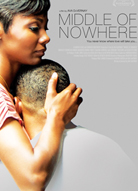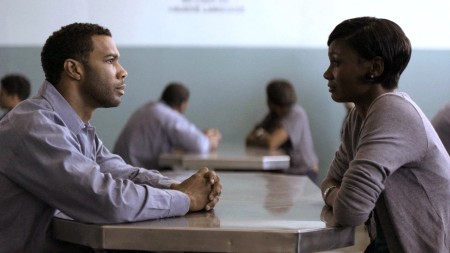 Is it trite to start a film review with a Langston Hughes quote? Near the end of Middle of Nowhere, after Rosie (Lorraine Toussaint) yelled out "Every year is next year for you!" I kept thinking of the Hughes poem Harlem: “What happens to a dream deferred?” Hughes offered several possibilities, but his final warning rings truest for the characters in Middle of Nowhere:
Is it trite to start a film review with a Langston Hughes quote? Near the end of Middle of Nowhere, after Rosie (Lorraine Toussaint) yelled out "Every year is next year for you!" I kept thinking of the Hughes poem Harlem: “What happens to a dream deferred?” Hughes offered several possibilities, but his final warning rings truest for the characters in Middle of Nowhere:
Maybe it just sags
like a heavy load.
Or does it explode?
Ava DuVernay’s second feature casts an empathetic eye on how the day-to-day particulars of supporting a spouse in prison - the hours of travel, legal battles, fees, bus rides and delayed desires - slowly, inexorably wear down even the most hopeful people. So what does happen for those deferred dream people who wait for next year?
Unlike I Will Follow, Middle of Nowhere is not based on personal experience. Regardless, the film feels intensely personal. It’s told from the point of view of Ruby (Emayatzy Corinealdi, in what would be a star-turn if there was any justice in the world). Ruby drops out of medical school and becomes as a night nurse to support her husband, Derek (Omari Hardwick, sullen in a prison jumpsuit or smiling in Ruby’s memories). He is serving an 8 year prison sentence for an initially unvoiced crime. Though Ruby supports Derek financially, legally, and emotionally, her own support system is thin - a doting but directionless sister (Edwina Findley), a mother (Lorraine Toussaint) whose good advice is undermined by poor delivery, and an amorous bus driver (David Oyelowo). The cast is extraordinary, and the film is shot by TFE favorite Bradford Young, but what DuVernay does with her raw materials turns the film from simple melodrama to subtle character study.

The paths of prison dramas are littered with snares and stereotypes - the violent prisoner, the passive scapegoat, the sainted wife, the cheater. DuVernay confronts these generic cliches by refusing to pass moral judgement, depriving both the audience and the characters any easy answers. Is Ruby selfish or selfless when she pushes for her husband’s parole? Is Derek a violent criminal or a victim of the system? (And perhaps most important for the love story: will David Oyelowo take off his shirt again?) DuVernay is less interested in answering these questions than she is in how people live without the answers they need.
DuVernay’s growth as a filmmaker between 2010 and 2012 can be seen most strongly in her leaps as a storyteller. The most powerful scene comes at Derek’s parole hearing, when Ruby looks like some of her questions might be answered. A hundred emotions shift across Emayatzy Corinealdi’s face as Ruby listens to her husband be accused of extra crimes and betrayals in prison. Derek remains totally unreadable. As Derek is led out of the courtroom in slow motion, back to the camera and his wife, uncertainty and desperation explode. It’s a palpable turning point driven by camera and action. This is one of many such scenes. Gone is the awkward camerawork of a new director; with Bradford Young, Ava DuVernay has found a cinematographer who can help the audience see her characters with the same dignified beauty she does.
DuVernay always understood people, but Middle of Nowhere gains the structure that I Will Follow lacked without sacrificing the complications of human emotion. DuVernay deservedly won Best Director at Sundance for Middle of Nowhere. She even managed to better the indie festival’s notorious White Guy Problem by using her laurels to launch her next film.
The running theme through Ava Duvernay's first two films is devotion - whom we devote ourselves to and why. In her third film, devotion will be a key element again, though the scale and stakes will increase for both the characters and the director. Only 10 days until the Oscars. Have you seen Selma?

Upcoming Films This Month:
Thursday, 2/19: Selma (2014) - Nominated for two Academy Awards: Best Picture and Best Song. (In theaters)
If you have suggestions for future Women’s Pictures directors, post them in the comments or find Anne Marie on Twitter!